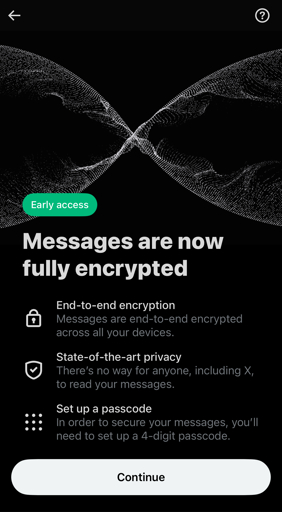[JS Required] EU Unveils DNS4EU, a Public DNS Resolver Intended as a European Alternative to Services Like Google’s Public DNS and Cloudflare’s DNS.
-
Protective resolution ad-blocking
IP address:
86.54.11.13IPv6:
2a13:1001::86:54:11:13DNS over HTTPS:
noads.joindns4.eu/dns-queryDNS over TLS:
noads.joindns4.eu -
Protective resolution ad-blocking
IP address:
86.54.11.13IPv6:
2a13:1001::86:54:11:13DNS over HTTPS:
noads.joindns4.eu/dns-queryDNS over TLS:
noads.joindns4.euNice, but a shame it's not as easy to remember as 8.8.8.8.
-
Nice, but a shame it's not as easy to remember as 8.8.8.8.
Also 1.1.1.1 and 9.9.9.9
-
Nice, but a shame it's not as easy to remember as 8.8.8.8.
That's it, I can't use it, fuck.
-
Protective resolution ad-blocking
IP address:
86.54.11.13IPv6:
2a13:1001::86:54:11:13DNS over HTTPS:
noads.joindns4.eu/dns-queryDNS over TLS:
noads.joindns4.euAny counter indication to using this from Canada?
-
Any counter indication to using this from Canada?
Don't think so, will be a tiny bit slower to reach.
-
Also 1.1.1.1 and 9.9.9.9
Also Quad9 is Swiss which may actually better than EU?
-
Protective resolution ad-blocking
IP address:
86.54.11.13IPv6:
2a13:1001::86:54:11:13DNS over HTTPS:
noads.joindns4.eu/dns-queryDNS over TLS:
noads.joindns4.euMullvad DNS has been great also.
-
Also Quad9 is Swiss which may actually better than EU?
Not sure why would it be better. EU provides strict personal data regulations guarantees
-
Not sure why would it be better. EU provides strict personal data regulations guarantees
Switzerland has pretty decent privacy laws of its own, why you think Swiss bank accounts are a meme?
-
Protective resolution ad-blocking
IP address:
86.54.11.13IPv6:
2a13:1001::86:54:11:13DNS over HTTPS:
noads.joindns4.eu/dns-queryDNS over TLS:
noads.joindns4.euI was wondering about some of the fuckery around piracy in the EU atm:
This project provides the European Commission with no means of censorship. Furthermore, this would be against the goals of the project, which aims to strengthen digital sovereignty. The EU will not have access to configuration, data, etc. On top of that, DNS4EU will not be forced on anyone. It will merely abide to local regulations required of internet service provider. In other words, DNS4EU is not a way toward censorship, but actually toward data protection and better internet security and sovereignty for Europeans.
-
Switzerland has pretty decent privacy laws of its own, why you think Swiss bank accounts are a meme?
Cause they have nazi gold in their banks. Your data is belong to them. Don't be confused!
-
Any counter indication to using this from Canada?
In Canada we have CIRA Canadian Shield
-
Switzerland has pretty decent privacy laws of its own, why you think Swiss bank accounts are a meme?
Switzerland has done a 180 on that. A new amendment would require all VPN services, messaging apps, and social networks to identify and retain user data.

Cloud service Infomaniak steps up fight with Proton over controversial Swiss surveillance law
Infomaniak criticised Proton's stance againt the amendment, causing a stir across the Swiss privacy tech sector
TechRadar (www.techradar.com)
-
In Canada we have CIRA Canadian Shield
Have you looked into their privacy policy, is it alright?
-
Nice, but a shame it's not as easy to remember as 8.8.8.8.
Seems quite easy to remember with a nice jingle, like the emergency number...
 0118 999 881 999 119 725
0118 999 881 999 119 725 . 3
. 3 .
. -
Protective resolution ad-blocking
IP address:
86.54.11.13IPv6:
2a13:1001::86:54:11:13DNS over HTTPS:
noads.joindns4.eu/dns-queryDNS over TLS:
noads.joindns4.euRun your own DNS resolver
How does DNS4EU support NIS2?
“Member states should encourage the development and use of public and secure European DNS resolver service.” NIS2 directive, 2023
DNS4EU, a European initiative, presents multiple avenues for establishing a secure and compliant DNS resolver, aligning seamlessly with EU regulations. Its base lies in the cornerstone EU documents such as the Cybersecurity Strategy of the EU.
Finally, it was recommended in the European Parliament and Council’s directive NIS2.
only one point - the whole setup is...

-
Also Quad9 is Swiss which may actually better than EU?
This confuses the fuck out of me because my VPN in Switzerland using TLS DNS shows Germany as the country in DNS leak tests.
The Swiss DNS provider doesn’t have servers in Switzerland?
-
Seems quite easy to remember with a nice jingle, like the emergency number...
 0118 999 881 999 119 725
0118 999 881 999 119 725 . 3
. 3 .
.800 588 2300 Empire today
-
I was wondering about some of the fuckery around piracy in the EU atm:
This project provides the European Commission with no means of censorship. Furthermore, this would be against the goals of the project, which aims to strengthen digital sovereignty. The EU will not have access to configuration, data, etc. On top of that, DNS4EU will not be forced on anyone. It will merely abide to local regulations required of internet service provider. In other words, DNS4EU is not a way toward censorship, but actually toward data protection and better internet security and sovereignty for Europeans.
So it will censor stuff as requested by governments





